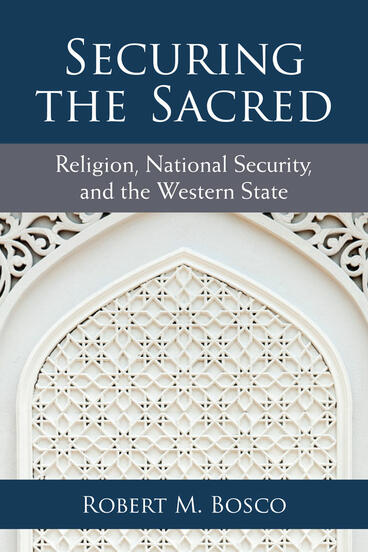Securing the Sacred
Religion, National Security, and the Western State
By treating religion as a key security concern, Western democracies may be undermining their safety
Description
Since the terrorist attacks of September 11, 2001, Western nations have increasingly recognized religion as a consideration in domestic and foreign policy. In this empirical comparison of the securitization of Islam in Britain, France, and the United States, Robert M. Bosco argues that religion is a category of phenomena defined by the discourses and politics of both religious and state elites.
Despite significant theoretical distinctions between securitization on the domestic and the international levels, he finds that the outcome of addressing religion within the context of security hinges upon partnerships. Whereas states may harness the power of international allies, they cannot often find analogous domestic allies; therefore, states that attempt to securitize religion at home are more vulnerable to counterattack and more likely to abandon their efforts. Securing the Sacred makes a significant contribution to the fields of political theory, international relations, Islamic studies, and security/military studies.
Robert M. Bosco is Assistant Professor of International Studies at Centre College.
Reviews
“Framing religion as a national security matter is perilous, as this short but well-argued volume demonstrates. . . Recommended.”
—Choice
“Invitingly and lucidly written, the text is accessibly to lay readers and academics alike and will provoke both audiences equally. Robert Bosco’s Securing the Sacred should appear on any syllabus covering religion and politics and is enthusiastically recommended for all scholars of religion and international affairs.”
—Critical Research on Religion
"Bosco’s Securing the Sacred is the most important book on the politics of secularism to appear since Elizabeth Shakman Hurd’s 2008 volume The Politics of Secularism in International Relations. ... Invitingly and lucidly written, the text is accessibly to lay readers and academics alike and will provoke both audiences equally. Robert Bosco’s Securing the Sacred should appear on any syllabus covering religion and politics and is enthusiastically recommended for all scholars of religion and international affairs."
- Ron E Hassner, University of California, Berkeley
--- Critical Research on Religion
"Framing religion as a national security matter is perilous, as this short but well-argued volume demonstrates… Recommended."
- L. Stan
--Choice

